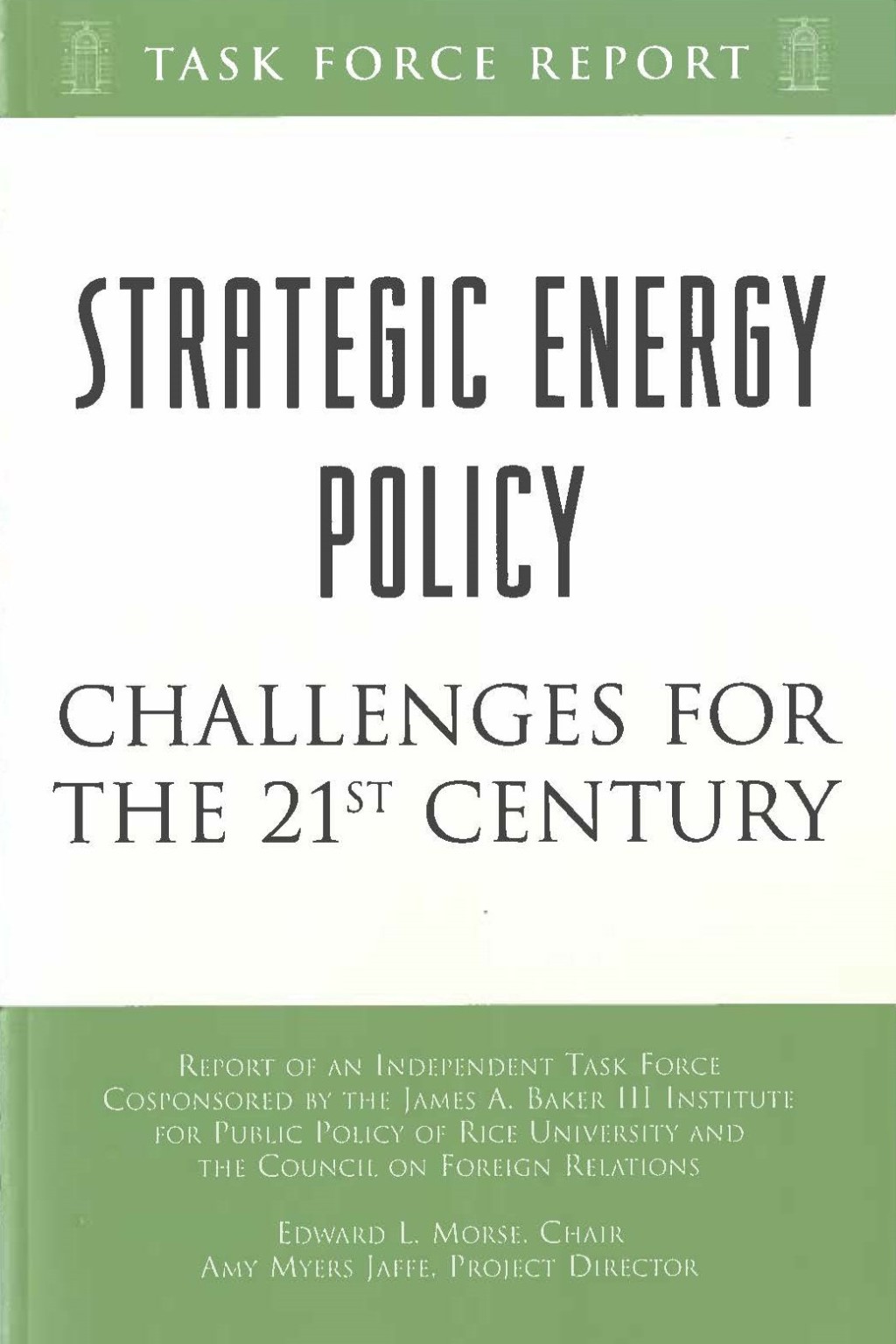Task Force Report No. #33
Strategic Energy Policy Challenges for the 21st Century
- Edward L. MorseCochair
- Amy M. JaffeDirector
What are Task Force Reports?
CFR sponsors Task Forces to assess issues of critical importance to U.S. foreign policy to reach bipartisan consensus on policy recommendations.
Who makes them?
Task Force members aim to reach a meaningful consensus on policy and are solely responsible for the content of their report.
Cosponsored by James A. Baker III Institute for Public Policy of Rice University
There could be more Californias in America’s future unless the U.S. government adopts a long-term, comprehensive energy policy now, according to an Independent Task Force report cosponsored by the James A. Baker III Institute for Public Policy of Rice University in Houston and the Council on Foreign Relations.
Given the capital-intensive nature of the energy industry, such energy woes could worsen before they get better, the study notes. Americans should therefore brace themselves for more California-style electricity problems and seasonal shortfalls of natural gas and heating fuels, as well as occasional spikes in regional gasoline prices. The experts note, however, that the situation is not a sign that the world is running out of energy resources. Rather, the conditions are caused by chronic under-investment and soaring energy use. The report, signed by fifty-one experts with widely different backgrounds and perspectives on the problem, argues that President G.W. Bush has an opportunity to begin educating the public about this reality and to start building a broad base of popular support for the hard policy choices ahead. It warns that the United States now faces the consequences of not having had an energy policy over the last several decades. The report of the Task Force, chaired by Edward L. Morse, a widely recognized authority on energy at Hess Energy, and assisted by Amy Myers Jaffe of the Baker Institute, concludes that “there are no overnight solutions to the energy supply and infrastructure bottlenecks facing the nation and the world.”
The Task Force report warns that what lies ahead are agonizing policy tradeoffs between legitimate and competing interests. Among those tradeoffs, the report states, is whether Americans are willing to compromise their hunger for cheap energy to satisfy their increasing demand for cleaner energy and a cleaner environment.
Task Force Members
Task Force Members:
ODEH ABURDENE is managing partner of Capital Trust S.A. He was a manager in the international division of the American Security Bank in Washington, DC, and served as a vice president with the First National Bank of Chicago.
GRAHAM ALLISON is director of the Belfer Center for Science and International Affairs at Harvard University’s John F. Kennedy School of Government and Douglas Dillon professor of government. In the first term of the Clinton administration, he served as assistant secretary of defense for policy and plans.
JOSEPH C. BELL is a partner with Hogan and Hartson, LLP. He was previously U.S. designated representative for the International Energy Agency, Dispute Settlement Center; assistant general counsel of international affairs for the Federal Energy Administration (1974–77); and the Cabinet Task Force on Oil Import Controls (1969).
PATRICK CLAWSON is director for research at the Washington Institute for Near East Policy and was previously a senior economist at the International Monetary Fund, the World Bank, and the National Defense University. He has written or edited twelve books about the Middle East.
FRANCES D. COOK heads the Ballard Group LLC, a business facilitation service in Washington. She is a three-time former ambassador, including twice to energy-exporting countries. She twice served as deputy assistant secretary of state, where her specialty was political-military affairs.
JACK L. COPELAND is chairman of Copeland Consulting International, an investment and geopolitical advisory firm.
CHARLES B. CURTIS is senior adviser to the United Nations Foundation and the president of NTI, a newly formed foundation organized to reduce the contemporary threat from weapons of mass destruction. He has previously served as the deputy secretary and the undersecretary of the U.S. Department of Energy, the chairman of the Federal Energy Regulatory Commission, and the chief energy counsel of the U.S. House of Representatives’ Energy and Commerce Committee.
TOBY T. GATI is senior international adviser at Akin, Gump, Strauss, Hauer and Feld, LLP. She served as special assistant to the president and senior director for Russia, Ukraine, and the Eurasian States at the National Security Council in 1993, and then as assistant secretary of state for intelligence and research until May 1997.
LUIS GIUSTI currently serves as non-executive director of “Shell” Transport and Trading, and as senior adviser to the Center for Strategic and International Studies. Formerly, he was chairman and chief executive officer of Petroleos de Venezuela, S.A.
DAVID L. GOLDWYN is the principal of Goldwyn International Strategies, LLC, an international consulting firm. He served as assistant secretary of energy for international affairs and counselor to the secretary of energy, senior adviser to the permanent representative to the United Nations, and chief of staff for the undersecretary of state for political affairs under President Bill Clinton.
MICHEL T. HALBOUTY is an internationally renowned earth scientist and engineer whose career and accomplishments in the fields of geology and petroleum engineering have earned him the recognition as one of the world’s outstanding geo-scientists.
AMY MYERS JAFFE is the senior energy adviser at the James A. Baker III Institute for Public Policy of Rice University and president of AMJ Energy Consulting. Formerly she was the senior economist and Middle East analyst for Petroleum Intelligence Weekly. Jaffe is the author of numerous articles on oil geopolitics, the Middle East, and the Caspian basin region.
MELANIE A. KENDERDINE is the vice president of the Gas Technology Institute. Previously she was director of policy at the Department of Energy, senior policy adviser to the secretary of energy for oil and gas, deputy assistant secretary at Department of Energy, and chief of staff to Congressman Bill Richardson (D-N.M.).
JOSEPH P. KENNEDY II is chairman and president of Citizens Energy Corporation, a nonprofit firm he founded in 1979 to provide low-cost heating oil to the poor and the elderly. He left Citizens in 1986 to serve six terms in the U.S. House of Representatives and returned to Citizens Energy full-time in 1999 and serves on the boards of companies in the health care, telecommunications, and energy industries.
MARIE-JOSEE KRAVIS is an economist and senior fellow at the Hudson Institute. She specializes in trade and international finance-related issues and serves on the secretary of energy’s advisory board. She also sits on the boards of Ford Motor Company,Vivendi Universal, U.S.A Networks, Hasbro Inc., Hollinger International, and the CIBC.
KENNETH LAY is chairman and chief executive officer of Enron Corporation. Lay also was chief executive officer of Enron from 1985 until February 2001.
JOHN H. LICHTBLAU is chairman and chief executive officer of Petroleum Industry Research Foundation, Inc. He has been a member of the National Petroleum Council (advisory council to the secretary of energy) since 1968 and is also a member of the International Associates of Energy Economics.
JOHN A. MANZONI is regional president for British Petroleum in the eastern United States. Formerly he was group vice president for the refining and marketing business, and before that he headed up the BP side of the BP/Amoco merger directorate.
THOMAS F. MCLARTY III is vice chairman of Kissinger McLarty Associates, an international strategic advisory firm. He was President Bill Clinton’s first chief of staff and also served as counselor to the president and special envoy for the Americas. Prior to joining the Clinton administration, McLarty was chairman and chief executive officer of Arkla, Inc.
ERIC D.K. MELBY is a senior fellow with the Forum for International Policy and a principal in the Scowcroft Group. He handled economic and energy issues on the National Security Council staff from 1987–93 and was special assistant to the executive director of the International Energy Agency from 1981–85. He also worked in the Department of State and the U.S. Agency for International Development.
SARAH MILLER is editorial vice president and group editor of the Energy Intelligence Group. She was European director of McGraw-Hill News and London bureau chief and energy correspondent for McGraw-Hill World News.
STEVEN L. MILLER is chairman of the board of directors, president, and chief executive officer of Shell Oil Company. He is a member of the National Petroleum Council and the Business Roundtable.
ERNEST J. MONIZ is a professor of physics and former head of the department of physics at the Massachusetts Institute of Technology. He served as associate director for science in the Office of Science and Technology Policy in the Executive Office of the President (1995–97) and as undersecretary for energy, science, and environment in the Department of Energy (1997–2001). At the Department of Energy, he also served as the secretary’s special negotiator for Russian programs.
EDWARD L. MORSE is executive advisor at Hess Energy Trading Co., LLC. He joined HETCO in April 1999 after more than a decade as publisher of Petroleum Intelligence Weekly. From 1978 to 1981, Morse was at the Department of State, where he served as deputy assistant secretary for international energy policy. A frequent commentator on oil market trends, both in writing and for broadcast media, Morse is the author or co-author of four books on politics, finance, energy, and international affairs.
SHIRLEY NEFF is an economist for the Democrats on the Senate Energy and Natural Resources Committee. Prior to joining the committee staff, she was an economist for a state public utility commission and for an oil and gas company and an electricity utility.
DAVID O’REILLY is chairman of the board and chief executive officer of Chevron-Texaco. Earlier, O’Reilly was one of the company’s two vice chairmen, responsible for Chevron’s worldwide exploration and production and corporate human relations.
KENNETH RANDOLPH is general counsel and secretary of Dynegy, Inc., responsible for all of Dynegy’s legal and regulatory activities. Prior to joining Dynegy, he served as an energy attorney for the law firm of Akin, Gump, Strauss, Hauer and Feld in Washington, DC.
PETER ROSENTHAL is chief correspondent on energy and commodities for Bridge News.
GARY N. ROSS is chief executive officer of the PIRA Energy Group, a New York-based international energy consultancy retained by some three hundred companies in more than thirty countries.
ED ROTHSCHILD is principal at the consulting firm of Podesta/Mattoon in Washington, DC. Formerly the energy policy director of Citizen Action and consumer advocate on energy matters from 1971–97, he is also the author of numerous reports and studies on natural gas and oil pricing issues, competition, and concentration in the petroleum industry.
JEFFERSON B. SEABRIGHT is vice president of policy planning for Texaco, Inc. He was formerly the executive director of the White House Task Force on Climate Change, director of the Office of Energy, Environment and Technology, and U.S. Agency for International Development.
ADAM SIEMINSKI is the director and global energy strategist at Deutsche Banc Alex Brown. From 1988–97, he was a senior equity analyst for NatWest Securities, covering the major U.S.-based international oil companies.
MATHEW SIMMONS is president of Simmons and Company International, a specialized energy investment bank. He is a member of the National Petroleum Council and Bush-Cheney Energy Transition Advisory Committee.
RONALD SOLIGO is a professor of economics at Rice University with a specialty in development and energy economics. He has authored a number of studies on energy-related topics for the James A. Baker III Institute for Public Policy at Rice University.
MICHAEL D. TUSIANI has been chairman and chief executive officer of Poten and Partners since 1983. Prior to joining Poten in 1973, he was employed by Zapata Naess Shipping Company. He has written two books: The Petroleum Shipping Industry—A Non-technical Overview and The Petroleum Shipping Industry—Operations and Practices.
PHILIP K.V ERLEGER JR. is president of PK Verleger LLC and a principal with the Brattle Group. He served as an energy adviser in the Ford and Carter administrations and advised President Ronald Reagan on energy issues. He is the author of two books and numerous articles on the causes of energy price volatility.
ENZO VISCUSI is group senior vice president and representative for the Americas of Eni, the Italian-based integrated energy company, where he also serves as chairman of Agip Petroleum Co., Inc.
CHUCK WATSON is the chairman and chief executive office of Houston Dynegy Inc., a leading provider of energy and communications solutions. He established NGC Corp, Dynegy’s predecessor, in 1985 and served as president until becoming chairman and chief executive officer in 1989.
WILLIAM H. WHITE is president of the Wedge Group Inc., a diversified investment firm with subsidiaries in the oil services, engineering, hotel, and real estate business. He is chairman of the Houston World Affairs Council and served as deputy secretary and chief executive officer of the U.S. Department of Energy from 1993 to 1995.
DANIEL YERGEN is chairman of Cambridge Energy Research Associates. He is author of The Prize, for which he received the Pulitzer Prize, co-author of The Commanding Heights, and recipient of the U.S. Energy Award.
MINE YUCEL is senior economist and assistant vice president, Federal Reserve Bank of Dallas. He is a member of the U.S. Association of Energy Economics and the author of numerous articles on energy and the economy.






